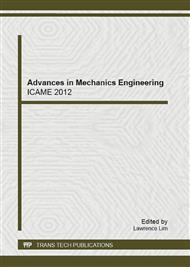[1]
H. Ohsaki, M. Sekino, and S. Nonaka, Characteristics of resistive fault current limiting elements using YBCO superconducting thin film with meander-shaped metal layer, IEEE Transaction on Applied Superconductivity, vol. 19, no. 3, p.1818–1822, June (2009).
DOI: 10.1109/tasc.2009.2019040
Google Scholar
[2]
Y. Xin, W. Z. Gong, X. Y. Niu, Y. Q. Gao, Q. Q. Guo, L. X. Xiao, Z. J. Cao, H. Hong, et al., Manufacturing and test of a 35 kV/90 MVA saturated iron-core type superconductive fault current limiter for live-grid operation, IEEE Transaction on Applied Superconductivity, vol. 19, no. 3, p.1934–1937, June (2009).
DOI: 10.1109/tasc.2009.2018510
Google Scholar
[3]
H. Yamaguchi, and T. Kataoka, Current Limiting Characteristics of Transformer Type Superconducting Fault Current Limiter with Shunt Impedance and Inductive Load, IEEE Transaction on Applied Superconductivity, vol. 18, no. 2, pp.668-671, June (2008).
DOI: 10.1109/tasc.2008.921258
Google Scholar
[4]
S. -H. Lim, J. -F. Moon, and J. -C. Kim, Improvement on current limiting characteristics of a flux-lock type SFCL using E-I core, IEEE Transaction on Applied Superconductivity, vol. 19, no. 3, p.1904–1907, June (2009).
DOI: 10.1109/tasc.2009.2017711
Google Scholar
[5]
L. Chen, Y. J. Tang, J. Shi, L. Ren, M. Song, S. J. Cheng, Y. Hu, and X. S. Chen, Effects of a voltage compensation type active superconducting fault current limiter on distance relay, Physica C: Superconductivity and its Applications, vol. 470, no. 20, pp.1662-1665, May (2010).
DOI: 10.1016/j.physc.2010.05.183
Google Scholar
[6]
J. Shi, Y. J. Tang, L. Chen, J. Wang, L. Ren, J. D. Li, L. Li, T. Peng, and S. J. Cheng, The application of active superconducting DC fault current limiter in hybrid AC/DC power supply systems, IEEE Transactions on Applied Superconductivity, vol. 18, no. 2, pp.672-675, June (2008).
DOI: 10.1109/tasc.2008.921888
Google Scholar
[7]
L. Chen, Y. J. Tang, Z. Li, L. Ren, J. Shi, and S. J. Cheng, Current Limiting Characteristics of a Novel Flux-Coupling Type Superconducting Fault Current Limiter, IEEE Transactions on Applied Superconductivity, vol. 20, no. 3, pp.1143-1146, June (2010).
DOI: 10.1109/tasc.2010.2044651
Google Scholar
[8]
L. Chen, Research of Voltage Compensation Type Active Superconducting Fault Current Limiter,. Doctoral Dissertation, Wuhan, Huazhong University of Science and Technology, (2010).
Google Scholar
[9]
L. Chen, Y. J. Tang, J. Shi, N. Chen, M. Song, S. J. Cheng, Y. Hu, and X. S. Chen, Influence of a voltage compensation type active superconducting fault current limiter on the transient stability of power system, Physica C: Superconductivity and its Applications, vol. 469, pp.1760-1764, May (2009).
DOI: 10.1016/j.physc.2009.05.143
Google Scholar


